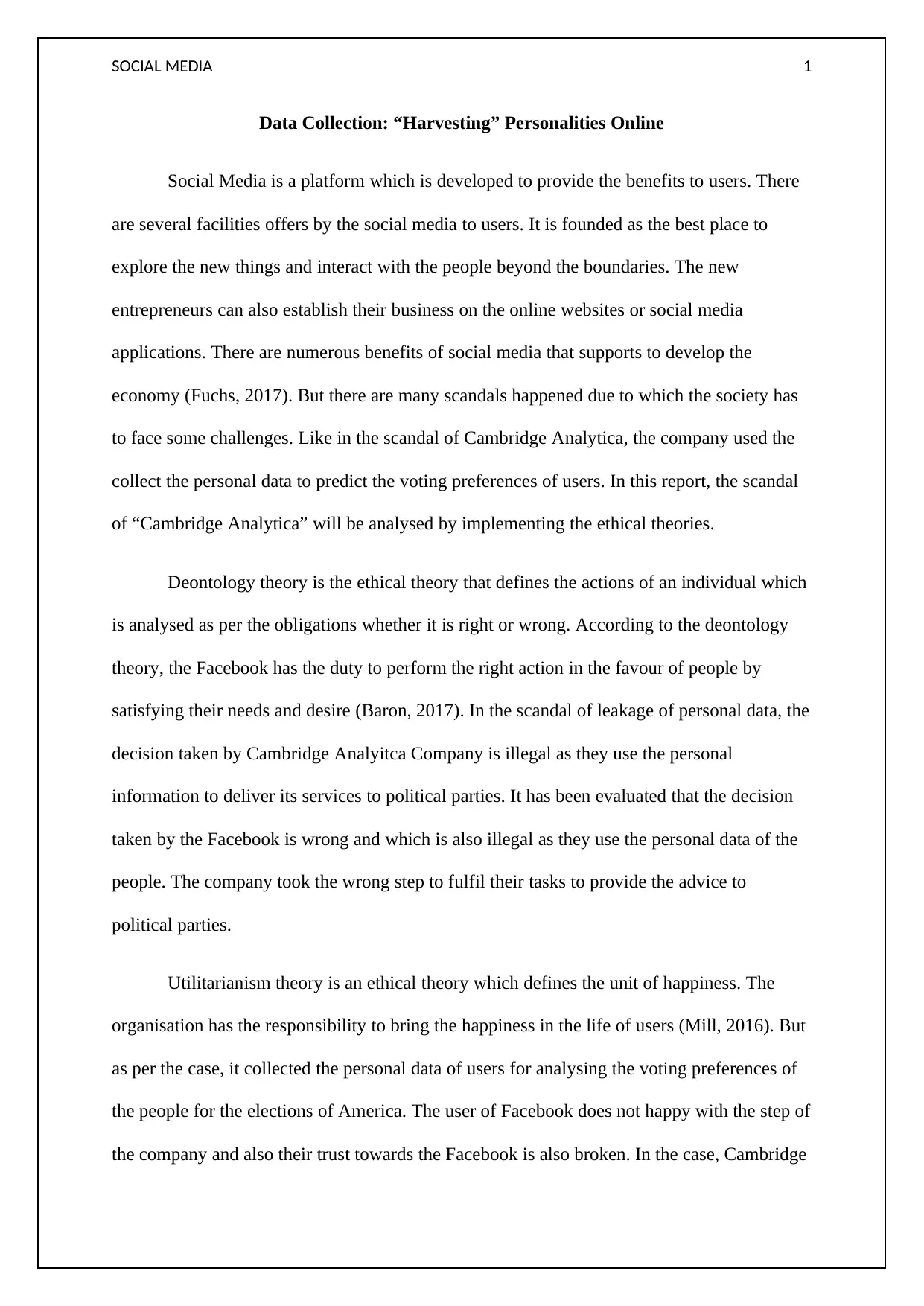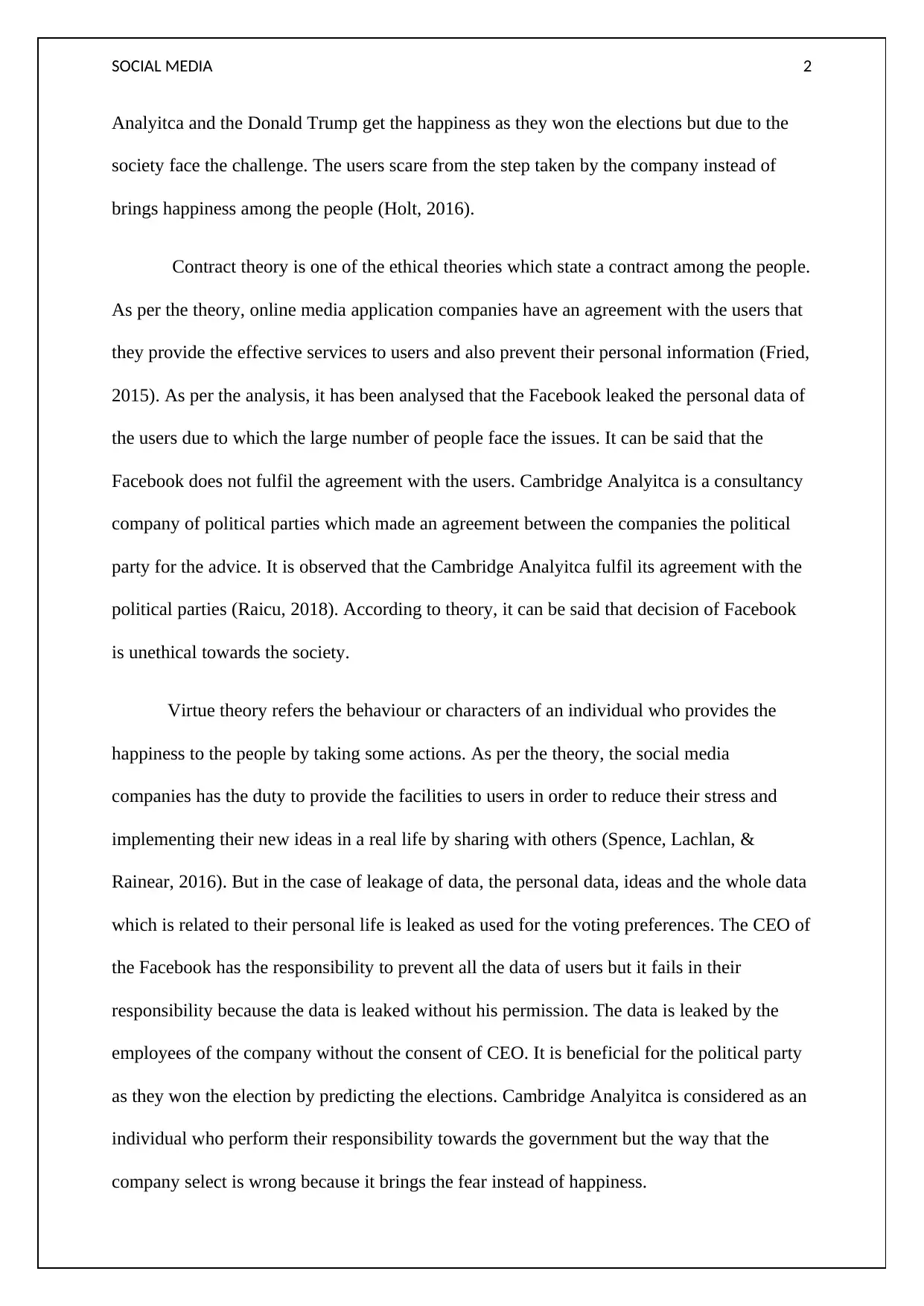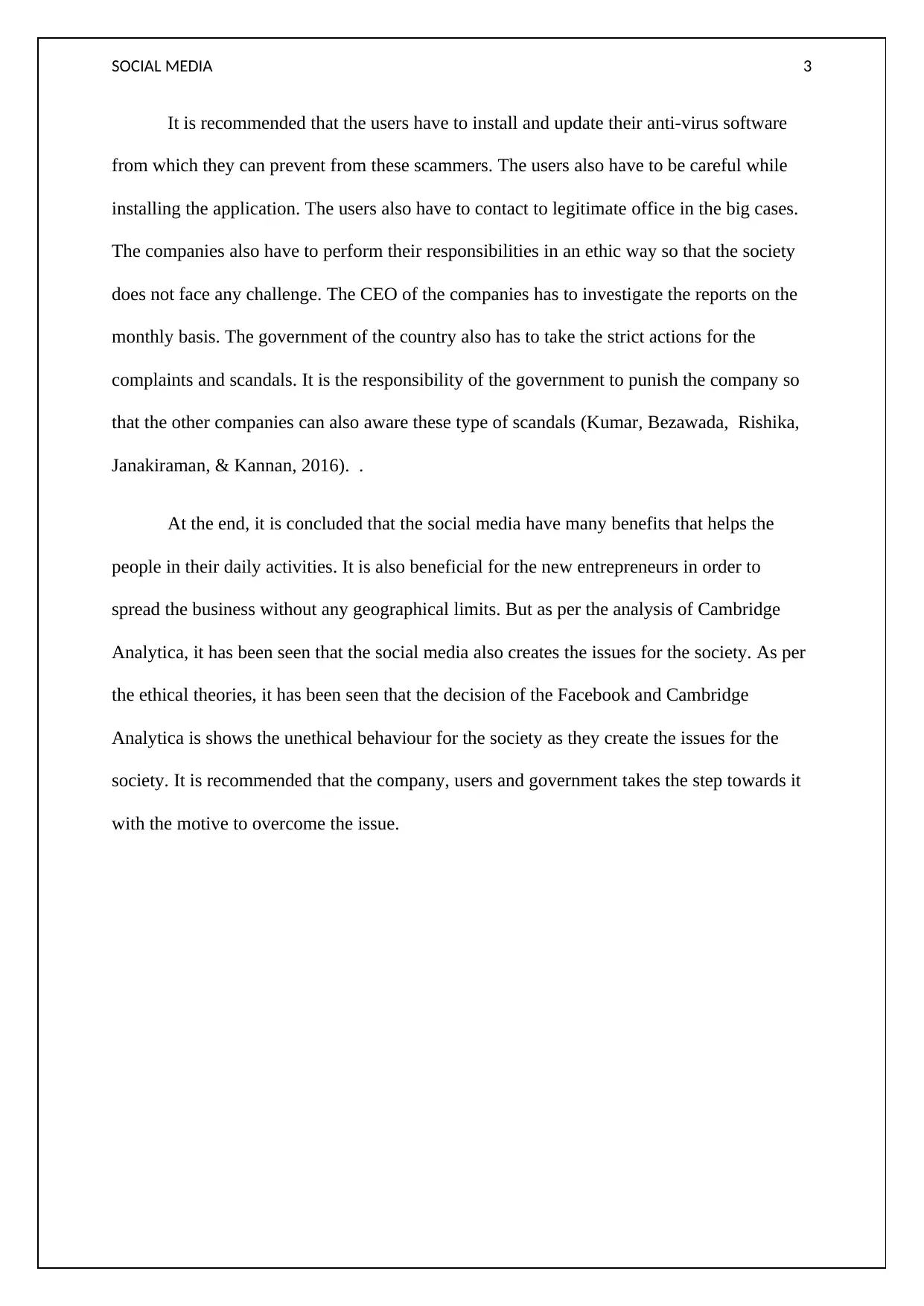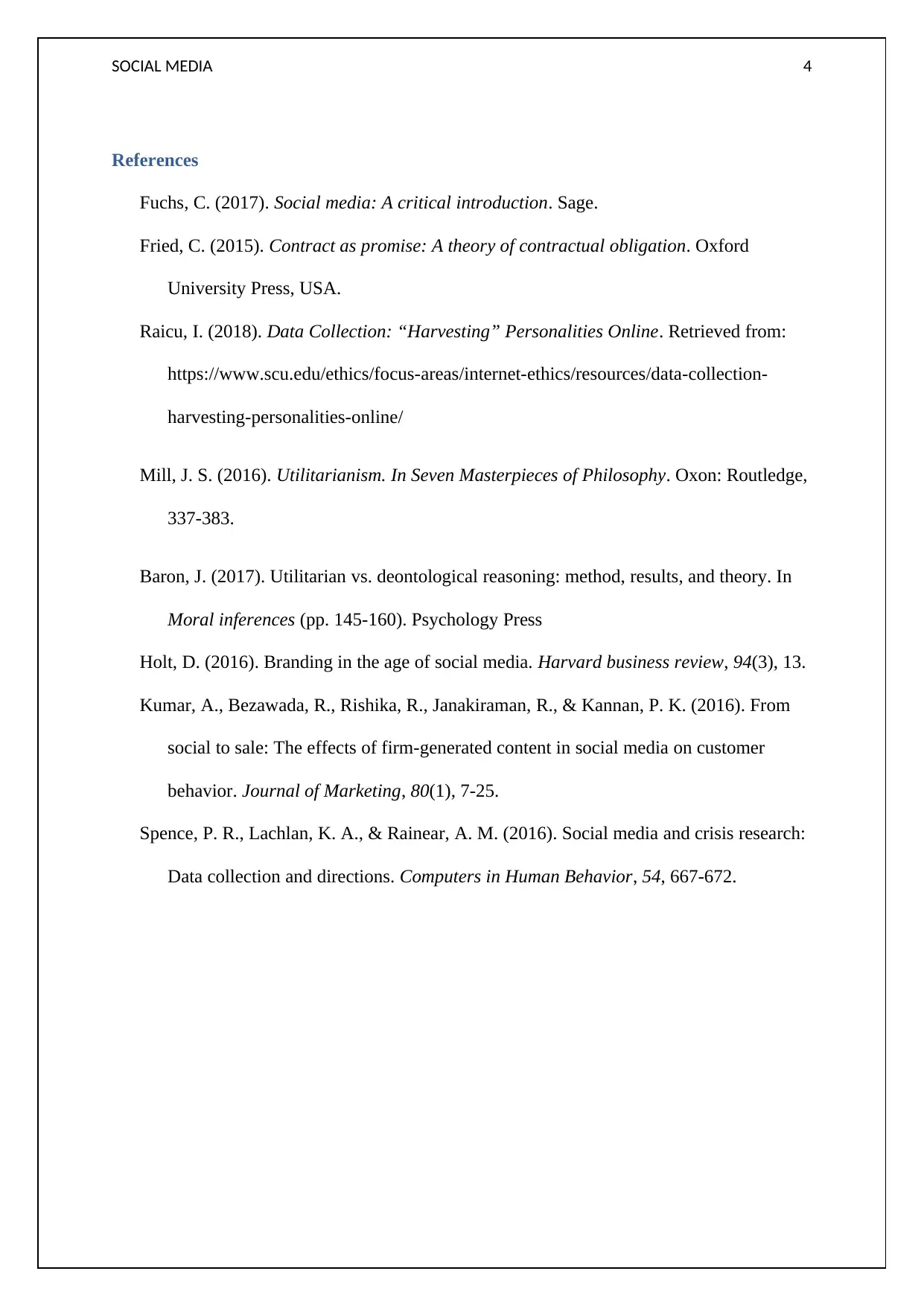Analysis of Cambridge Analytica Scandal: Social Media Data Ethics
VerifiedAdded on 2022/11/24
|5
|1293
|88
Report
AI Summary
This report analyzes the Cambridge Analytica scandal, examining the ethical implications of social media data collection through the lens of deontology, utilitarianism, contract theory, and virtue theory. The report highlights how Cambridge Analytica used personal data to predict voting preferences, leading to privacy breaches and a loss of user trust. The analysis reveals that Facebook and Cambridge Analytica's actions were unethical, violating user agreements and causing societal challenges. The report recommends users install anti-virus software, exercise caution when installing applications, and contact legitimate offices in big cases. Companies should act ethically, and governments must take strict actions against data scandals. The report concludes that while social media offers benefits, the Cambridge Analytica case demonstrates the potential for misuse, emphasizing the need for ethical data handling by companies, users, and governments.

Social Media
Paraphrase This Document
Need a fresh take? Get an instant paraphrase of this document with our AI Paraphraser

SOCIAL MEDIA 1
Data Collection: “Harvesting” Personalities Online
Social Media is a platform which is developed to provide the benefits to users. There
are several facilities offers by the social media to users. It is founded as the best place to
explore the new things and interact with the people beyond the boundaries. The new
entrepreneurs can also establish their business on the online websites or social media
applications. There are numerous benefits of social media that supports to develop the
economy (Fuchs, 2017). But there are many scandals happened due to which the society has
to face some challenges. Like in the scandal of Cambridge Analytica, the company used the
collect the personal data to predict the voting preferences of users. In this report, the scandal
of “Cambridge Analytica” will be analysed by implementing the ethical theories.
Deontology theory is the ethical theory that defines the actions of an individual which
is analysed as per the obligations whether it is right or wrong. According to the deontology
theory, the Facebook has the duty to perform the right action in the favour of people by
satisfying their needs and desire (Baron, 2017). In the scandal of leakage of personal data, the
decision taken by Cambridge Analyitca Company is illegal as they use the personal
information to deliver its services to political parties. It has been evaluated that the decision
taken by the Facebook is wrong and which is also illegal as they use the personal data of the
people. The company took the wrong step to fulfil their tasks to provide the advice to
political parties.
Utilitarianism theory is an ethical theory which defines the unit of happiness. The
organisation has the responsibility to bring the happiness in the life of users (Mill, 2016). But
as per the case, it collected the personal data of users for analysing the voting preferences of
the people for the elections of America. The user of Facebook does not happy with the step of
the company and also their trust towards the Facebook is also broken. In the case, Cambridge
Data Collection: “Harvesting” Personalities Online
Social Media is a platform which is developed to provide the benefits to users. There
are several facilities offers by the social media to users. It is founded as the best place to
explore the new things and interact with the people beyond the boundaries. The new
entrepreneurs can also establish their business on the online websites or social media
applications. There are numerous benefits of social media that supports to develop the
economy (Fuchs, 2017). But there are many scandals happened due to which the society has
to face some challenges. Like in the scandal of Cambridge Analytica, the company used the
collect the personal data to predict the voting preferences of users. In this report, the scandal
of “Cambridge Analytica” will be analysed by implementing the ethical theories.
Deontology theory is the ethical theory that defines the actions of an individual which
is analysed as per the obligations whether it is right or wrong. According to the deontology
theory, the Facebook has the duty to perform the right action in the favour of people by
satisfying their needs and desire (Baron, 2017). In the scandal of leakage of personal data, the
decision taken by Cambridge Analyitca Company is illegal as they use the personal
information to deliver its services to political parties. It has been evaluated that the decision
taken by the Facebook is wrong and which is also illegal as they use the personal data of the
people. The company took the wrong step to fulfil their tasks to provide the advice to
political parties.
Utilitarianism theory is an ethical theory which defines the unit of happiness. The
organisation has the responsibility to bring the happiness in the life of users (Mill, 2016). But
as per the case, it collected the personal data of users for analysing the voting preferences of
the people for the elections of America. The user of Facebook does not happy with the step of
the company and also their trust towards the Facebook is also broken. In the case, Cambridge

SOCIAL MEDIA 2
Analyitca and the Donald Trump get the happiness as they won the elections but due to the
society face the challenge. The users scare from the step taken by the company instead of
brings happiness among the people (Holt, 2016).
Contract theory is one of the ethical theories which state a contract among the people.
As per the theory, online media application companies have an agreement with the users that
they provide the effective services to users and also prevent their personal information (Fried,
2015). As per the analysis, it has been analysed that the Facebook leaked the personal data of
the users due to which the large number of people face the issues. It can be said that the
Facebook does not fulfil the agreement with the users. Cambridge Analyitca is a consultancy
company of political parties which made an agreement between the companies the political
party for the advice. It is observed that the Cambridge Analyitca fulfil its agreement with the
political parties (Raicu, 2018). According to theory, it can be said that decision of Facebook
is unethical towards the society.
Virtue theory refers the behaviour or characters of an individual who provides the
happiness to the people by taking some actions. As per the theory, the social media
companies has the duty to provide the facilities to users in order to reduce their stress and
implementing their new ideas in a real life by sharing with others (Spence, Lachlan, &
Rainear, 2016). But in the case of leakage of data, the personal data, ideas and the whole data
which is related to their personal life is leaked as used for the voting preferences. The CEO of
the Facebook has the responsibility to prevent all the data of users but it fails in their
responsibility because the data is leaked without his permission. The data is leaked by the
employees of the company without the consent of CEO. It is beneficial for the political party
as they won the election by predicting the elections. Cambridge Analyitca is considered as an
individual who perform their responsibility towards the government but the way that the
company select is wrong because it brings the fear instead of happiness.
Analyitca and the Donald Trump get the happiness as they won the elections but due to the
society face the challenge. The users scare from the step taken by the company instead of
brings happiness among the people (Holt, 2016).
Contract theory is one of the ethical theories which state a contract among the people.
As per the theory, online media application companies have an agreement with the users that
they provide the effective services to users and also prevent their personal information (Fried,
2015). As per the analysis, it has been analysed that the Facebook leaked the personal data of
the users due to which the large number of people face the issues. It can be said that the
Facebook does not fulfil the agreement with the users. Cambridge Analyitca is a consultancy
company of political parties which made an agreement between the companies the political
party for the advice. It is observed that the Cambridge Analyitca fulfil its agreement with the
political parties (Raicu, 2018). According to theory, it can be said that decision of Facebook
is unethical towards the society.
Virtue theory refers the behaviour or characters of an individual who provides the
happiness to the people by taking some actions. As per the theory, the social media
companies has the duty to provide the facilities to users in order to reduce their stress and
implementing their new ideas in a real life by sharing with others (Spence, Lachlan, &
Rainear, 2016). But in the case of leakage of data, the personal data, ideas and the whole data
which is related to their personal life is leaked as used for the voting preferences. The CEO of
the Facebook has the responsibility to prevent all the data of users but it fails in their
responsibility because the data is leaked without his permission. The data is leaked by the
employees of the company without the consent of CEO. It is beneficial for the political party
as they won the election by predicting the elections. Cambridge Analyitca is considered as an
individual who perform their responsibility towards the government but the way that the
company select is wrong because it brings the fear instead of happiness.
⊘ This is a preview!⊘
Do you want full access?
Subscribe today to unlock all pages.

Trusted by 1+ million students worldwide

SOCIAL MEDIA 3
It is recommended that the users have to install and update their anti-virus software
from which they can prevent from these scammers. The users also have to be careful while
installing the application. The users also have to contact to legitimate office in the big cases.
The companies also have to perform their responsibilities in an ethic way so that the society
does not face any challenge. The CEO of the companies has to investigate the reports on the
monthly basis. The government of the country also has to take the strict actions for the
complaints and scandals. It is the responsibility of the government to punish the company so
that the other companies can also aware these type of scandals (Kumar, Bezawada, Rishika,
Janakiraman, & Kannan, 2016). .
At the end, it is concluded that the social media have many benefits that helps the
people in their daily activities. It is also beneficial for the new entrepreneurs in order to
spread the business without any geographical limits. But as per the analysis of Cambridge
Analytica, it has been seen that the social media also creates the issues for the society. As per
the ethical theories, it has been seen that the decision of the Facebook and Cambridge
Analytica is shows the unethical behaviour for the society as they create the issues for the
society. It is recommended that the company, users and government takes the step towards it
with the motive to overcome the issue.
It is recommended that the users have to install and update their anti-virus software
from which they can prevent from these scammers. The users also have to be careful while
installing the application. The users also have to contact to legitimate office in the big cases.
The companies also have to perform their responsibilities in an ethic way so that the society
does not face any challenge. The CEO of the companies has to investigate the reports on the
monthly basis. The government of the country also has to take the strict actions for the
complaints and scandals. It is the responsibility of the government to punish the company so
that the other companies can also aware these type of scandals (Kumar, Bezawada, Rishika,
Janakiraman, & Kannan, 2016). .
At the end, it is concluded that the social media have many benefits that helps the
people in their daily activities. It is also beneficial for the new entrepreneurs in order to
spread the business without any geographical limits. But as per the analysis of Cambridge
Analytica, it has been seen that the social media also creates the issues for the society. As per
the ethical theories, it has been seen that the decision of the Facebook and Cambridge
Analytica is shows the unethical behaviour for the society as they create the issues for the
society. It is recommended that the company, users and government takes the step towards it
with the motive to overcome the issue.
Paraphrase This Document
Need a fresh take? Get an instant paraphrase of this document with our AI Paraphraser

SOCIAL MEDIA 4
References
Fuchs, C. (2017). Social media: A critical introduction. Sage.
Fried, C. (2015). Contract as promise: A theory of contractual obligation. Oxford
University Press, USA.
Raicu, I. (2018). Data Collection: “Harvesting” Personalities Online. Retrieved from:
https://www.scu.edu/ethics/focus-areas/internet-ethics/resources/data-collection-
harvesting-personalities-online/
Mill, J. S. (2016). Utilitarianism. In Seven Masterpieces of Philosophy. Oxon: Routledge,
337-383.
Baron, J. (2017). Utilitarian vs. deontological reasoning: method, results, and theory. In
Moral inferences (pp. 145-160). Psychology Press
Holt, D. (2016). Branding in the age of social media. Harvard business review, 94(3), 13.
Kumar, A., Bezawada, R., Rishika, R., Janakiraman, R., & Kannan, P. K. (2016). From
social to sale: The effects of firm-generated content in social media on customer
behavior. Journal of Marketing, 80(1), 7-25.
Spence, P. R., Lachlan, K. A., & Rainear, A. M. (2016). Social media and crisis research:
Data collection and directions. Computers in Human Behavior, 54, 667-672.
References
Fuchs, C. (2017). Social media: A critical introduction. Sage.
Fried, C. (2015). Contract as promise: A theory of contractual obligation. Oxford
University Press, USA.
Raicu, I. (2018). Data Collection: “Harvesting” Personalities Online. Retrieved from:
https://www.scu.edu/ethics/focus-areas/internet-ethics/resources/data-collection-
harvesting-personalities-online/
Mill, J. S. (2016). Utilitarianism. In Seven Masterpieces of Philosophy. Oxon: Routledge,
337-383.
Baron, J. (2017). Utilitarian vs. deontological reasoning: method, results, and theory. In
Moral inferences (pp. 145-160). Psychology Press
Holt, D. (2016). Branding in the age of social media. Harvard business review, 94(3), 13.
Kumar, A., Bezawada, R., Rishika, R., Janakiraman, R., & Kannan, P. K. (2016). From
social to sale: The effects of firm-generated content in social media on customer
behavior. Journal of Marketing, 80(1), 7-25.
Spence, P. R., Lachlan, K. A., & Rainear, A. M. (2016). Social media and crisis research:
Data collection and directions. Computers in Human Behavior, 54, 667-672.
1 out of 5
Related Documents
Your All-in-One AI-Powered Toolkit for Academic Success.
+13062052269
info@desklib.com
Available 24*7 on WhatsApp / Email
![[object Object]](/_next/static/media/star-bottom.7253800d.svg)
Unlock your academic potential
Copyright © 2020–2026 A2Z Services. All Rights Reserved. Developed and managed by ZUCOL.





